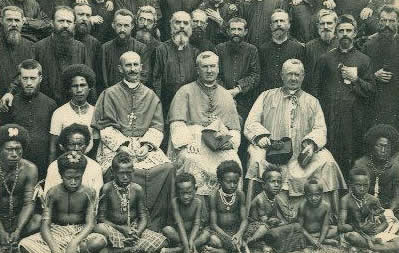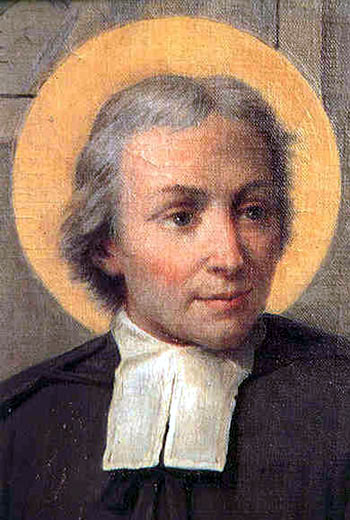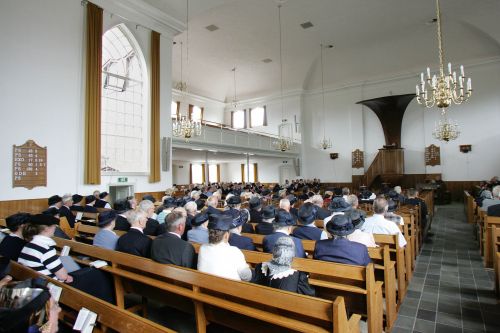|
Alain De Boismenu
Alain Marie Guynot de Boismenu (27 December 1870 – 5 November 1953) was a French Roman Catholic prelate who served as the Vicar Apostolic of Papua from 1908 until his retirement in 1945; he was a professed member of the Missionaries of the Sacred Heart and the founder of the Handmaids of the Lord. He studied under the De La Salle Brothers before beginning his religious formation in Belgium where he did his studies for the priesthood. He served for a brief period as a teacher before being sent in 1897 to Papua New Guinea to aid in the missions there; he also served the ailing apostolic vicar and was soon after made his coadjutor with the right of succession. His stewardship of the apostolic vicariate saw the number of missions and catechists increase and his tenure also saw the establishment of new schools and a training center for catechists. The beatification process for the late bishop launched in 1984 and he became titled as a Servant of God. He later became titled as Vene ... [...More Info...] [...Related Items...] OR: [Wikipedia] [Google] [Baidu] |
Venerable
The Venerable (''venerabilis'' in Latin) is a style, a title, or an epithet which is used in some Western Christian churches, or it is a translation of similar terms for clerics in Eastern Orthodoxy and monastics in Buddhism. Christianity Catholic In the Catholic Church, after a deceased Catholic has been declared a Servant of God by a bishop and proposed for beatification by the Pope, such a servant of God may next be declared venerable (" heroic in virtue") during the investigation and process leading to possible canonization as a saint. A declaration that a person is venerable is not a pronouncement of their presence in Heaven. The pronouncement means it is considered likely that they are in heaven, but it is possible the person could still be in purgatory. Before one is considered venerable, one must be declared by a proclamation, approved by the Pope, to have lived a life that was "heroic in virtue" (the theological virtues of faith, hope, and charity and the cardinal virt ... [...More Info...] [...Related Items...] OR: [Wikipedia] [Google] [Baidu] |
De La Salle Brothers
french: Frères des Écoles Chrétiennes , image = Signum Fidei.jpg , image_size = 175px , caption = , abbreviation = FSC , nickname = Lasallians , named_after = , formation = , founder = Jean-Baptiste de la Salle , founding_location = Rheims, Kingdom of France , type = Lay religious congregation of pontifical right (for men) , status = , purpose = Education , methods = , headquarters = Via Aurelia 476, Rome, Italy , region = Worldwide , services = Education , membership = 3,329 members as of 2020 , sec_gen = Br. Antxon Andueza, FSC , leader_title = Superior General , leader_name = Br. Armin A. Luistro, F.S.C. , leader_title2 = Vicar General , leader_name2 = Br. Carlos Gabriel Gómez Restrepo, , leader_title3 = Motto , leader_name ... [...More Info...] [...Related Items...] OR: [Wikipedia] [Google] [Baidu] |
Spiritual Director
Spiritual direction is the practice of being with people as they attempt to deepen their relationship with the divine, or to learn and grow in their personal spirituality. The person seeking direction shares stories of their encounters of the divine, or how they are cultivating a life attuned to spiritual things. The director listens and asks questions to assist the directee in his or her process of reflection and spiritual growth. Spiritual direction advocates claim that it develops a deeper awareness with the spiritual aspect of being human, and that it is neither psychotherapy nor counseling nor financial planning. Historians of philosophy like Ilsetraut and Pierre Hadot have argued that spiritual direction was already practiced and recommended by the main schools of philosophy, as well as by physicians like Galen, as part of spiritual practices in Ancient Greece and Rome. Roman Catholic forms While there is some degree of variability, there are primarily two forms of sp ... [...More Info...] [...Related Items...] OR: [Wikipedia] [Google] [Baidu] |
Missionaries
A missionary is a member of a religious group which is sent into an area in order to promote its faith or provide services to people, such as education, literacy, social justice, health care, and economic development.Thomas Hale 'On Being a Missionary' 2003, William Carey Library Pub, . In the Latin translation of the Bible, Jesus Christ says the word when he sends the disciples into areas and commands them to preach the gospel in his name. The term is most commonly used in reference to Christian missions, but it can also be used in reference to any creed or ideology. The word ''mission'' originated in 1598 when Jesuits, the members of the Society of Jesus sent members abroad, derived from the Latin ( nom. ), meaning 'act of sending' or , meaning 'to send'. By religion Buddhist missions The first Buddhist missionaries were called "Dharma Bhanaks", and some see a missionary charge in the symbolism behind the Buddhist wheel, which is said to travel all over the earth bri ... [...More Info...] [...Related Items...] OR: [Wikipedia] [Google] [Baidu] |
Church (congregation)
A church (or local church) is a religious organization or congregation that meets in a particular location. Many are formally organized, with constitutions and by-laws, maintain offices, are served by clergy or lay leaders, and, in nations where this is permissible, often seek non-profit corporate status. Local churches often relate with, affiliate with, or consider themselves to be constitutive parts of denominations, which are also called churches in many traditions. Depending on the tradition, these organizations may connect local churches to larger church traditions, ordain and defrock clergy, define terms of membership and exercise church discipline, and have organizations for cooperative ministry such as educational institutions and missionary societies. Non-denominational churches are not part of denominations, but may consider themselves part of larger church movements without institutional expression. The word ''church'' may also be used for other religious communit ... [...More Info...] [...Related Items...] OR: [Wikipedia] [Google] [Baidu] |
Marriage In The Catholic Church
Marriage in the Catholic Church, also known as holy matrimony, is the "covenant by which a man and woman establish between themselves a partnership of the whole of life and which is ordered by its nature to the good of the spouses and the procreation and education of offspring", and which "has been raised by Christ the Lord to the dignity of a sacrament between the baptised." Catholic matrimonial law, based on Roman law regarding its focus on marriage as a free mutual agreement or contract, became the basis for the marriage law of all European countries, at least up to the Reformation. The Catholic Church recognizes as sacramental, (1) the marriages between two baptized non-Catholic Christians or between two baptized Orthodox Christians, as well as (2) marriages between baptized non-Catholic Christians and Catholic Christians, although in the latter case, consent from the diocesan bishop must be obtained, with this termed "permission to enter into a mixed marriage". To illustrat ... [...More Info...] [...Related Items...] OR: [Wikipedia] [Google] [Baidu] |
Heroic Virtue
Heroic virtue is a phrase coined by Augustine of Hippo to describe the virtue of early Christian martyrs and used by the Catholic Church. The Greek pagan term hero described a person with possibly superhuman abilities and great goodness, and "it connotes a degree of bravery, fame, and distinction which places a man high above his fellows".Catholic Encyclopedia of 1917 The term was later applied to other highly virtuous persons who do extraordinary good works. Heroic virtue is one of the requirements for beatification in the Catholic Church. The modern process for declaring heroic virtue is internal to the church and conducted by those in senior positions. Quoting the Catholic view from the article on Heroic Virtue by J. Wilhelm in the 1917 ''Catholic Encyclopedia'': Together with the four cardinal virtues the Christian saint must be endowed with the three theological virtues, especially with Divine charity, the virtue which informs all other virtues. As charity stands at ... [...More Info...] [...Related Items...] OR: [Wikipedia] [Google] [Baidu] |
Pope Francis
Pope Francis ( la, Franciscus; it, Francesco; es, link=, Francisco; born Jorge Mario Bergoglio, 17 December 1936) is the head of the Catholic Church. He has been the bishop of Rome and sovereign of the Vatican City State since 13 March 2013. Francis is the first pope to be a member of the Society of Jesus, the first from the Americas, the first from the Southern Hemisphere, and the first pope from outside Europe since Gregory III, a Syrian who reigned in the 8th century. Born in Buenos Aires, Argentina, Bergoglio worked for a time as a bouncer and a janitor as a young man before training to be a chemist and working as a technician in a food science laboratory. After recovering from a severe illness, he was inspired to join the Society of Jesus (Jesuits) in 1958. He was ordained a Catholic priest in 1969, and from 1973 to 1979 was the Jesuit provincial superior in Argentina. He became the archbishop of Buenos Aires in 1998 and was created a cardinal in 2001 by Pope John Pa ... [...More Info...] [...Related Items...] OR: [Wikipedia] [Google] [Baidu] |
Servant Of God
"Servant of God" is a title used in the Catholic Church to indicate that an individual is on the first step toward possible canonization as a saint. Terminology The expression "servant of God" appears nine times in the Bible, the first five in the Old Testament, the last four in the New Testament, New. The Hebrew Bible refers to "Moses the servant of Elohim" (עֶֽבֶד הָאֱלֹהִ֛ים ''‘eḇeḏ-hā’ĕlōhîm''; , , , and ). , ). refers to Joshua as ''‘eḇeḏ Yahweh'' (עֶ֣בֶד יְהוָ֑ה). The New Testament also describes Moses in this way in (τοῦ δούλου τοῦ Θεοῦ, ''tou doulou tou Theou''). Paul the Apostle, Paul calls himself "a servant of God" in (δοῦλος Θεοῦ, ''doulos Theou''), while Epistle of James, James calls himself "a servant of God and the Lord Jesus Christ" (θεοῦ καὶ κυρίου Ἰησοῦ χριστοῦ δοῦλος, ''Theou kai Kyriou Iēsou Christou doulos'') in . describes "servants of God" ... [...More Info...] [...Related Items...] OR: [Wikipedia] [Google] [Baidu] |
Catechists
Catechesis (; from Greek: , "instruction by word of mouth", generally "instruction") is basic Christian religious education of children and adults, often from a catechism book. It started as education of converts to Christianity, but as the religion became institutionalized, catechesis was used for education of members who had been baptized as infants. As defined in the Catechism of the Catholic Church, paragraph 5 (quoting Pope John Paul II's Apostolic Exhortation '' Catechesi tradendae'', §18): ''Catechesis'' is an education in the faith of children, young people and adults which includes especially the teaching of Christian doctrine imparted, generally speaking, in an organic and systematic way, with a view to initiating the hearers into the fullness of Christian life.In the Catholic Church, catechist is a term used of anyone engaged in religious formation and education, from the bishop to lay ecclesial ministers and clergy to volunteers at the local level. The primary ca ... [...More Info...] [...Related Items...] OR: [Wikipedia] [Google] [Baidu] |
Coadjutor
The term coadjutor (or coadiutor, literally "co-assister" in Latin) is a title qualifier indicating that the holder shares the office with another person, with powers equal to the other in all but formal order of precedence. These include: * Coadjutor bishop, or Coadjutor archbishop * Coadjutor vicar, or Coadjutor apostolic vicar * Coadjutor eparch, or Coadjutor archeparch * Coadjutor exarch, or Coadjutor apostolic exarch Overview The office is ancient. "Coadjutor", in the 1883 ''Catholic Dictionary'', says: Another source identifies three kinds of coadjutors: :(1) Temporal and revocable. :(2) Perpetual and irrevocable. :(3) Perpetual, with the right of future succession.''The Law of the Church: A Cyclopedia of Canon Law for English-speaking Countries'', Ethelred Luke Taunton, 1906, page 204. It describes: See also *Bishop (other) *Vicar (other) *Exarch (other) An exarch was a military governor within the Byzantine Empire and still is a high p ... [...More Info...] [...Related Items...] OR: [Wikipedia] [Google] [Baidu] |
Apostolic Vicar
Apostolic may refer to: The Apostles An Apostle meaning one sent on a mission: *The Twelve Apostles of Jesus, or something related to them, such as the Church of the Holy Apostles *Apostolic succession, the doctrine connecting the Christian Church to the original Twelve Apostles *The Apostolic Fathers, the earliest generation of post-Biblical Christian writers *The Apostolic Age, the period of Christian history when Jesus' apostles were living *The '' Apostolic Constitutions'', part of the Ante-Nicene Fathers collection Specific to the Roman Catholic Church *Apostolic Administrator, appointed by the Pope to an apostolic administration or a diocese without a bishop *Apostolic Camera, or "Apostolic Chamber", former department of finance for Papal administration * Apostolic constitution, a public decree issued by the Pope *Apostolic Palace, the residence of the Pope in Vatican City *Apostolic prefect, the head of a mission of the Roman Catholic Church *The Apostolic See, sometimes us ... [...More Info...] [...Related Items...] OR: [Wikipedia] [Google] [Baidu] |






